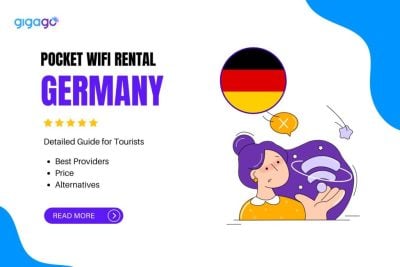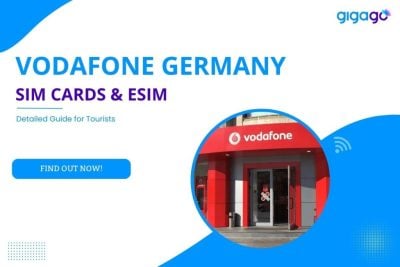Buying a SIM card at Munich Airport is a convenient method to maintain connectivity while visiting. It will be necessary for you to have a dependable Internet connection when visiting Germany.
How to Get Mobile Internet in Germany for Travelers: What Option to Choose?
Getting mobile internet in Germany is crucial for visitors to stay in touch. This article will explain the various options available to travelers, such as data SIM cards and eSIMs, to help them select the most cost-effective and speedy method of internet connection while visiting Germany.
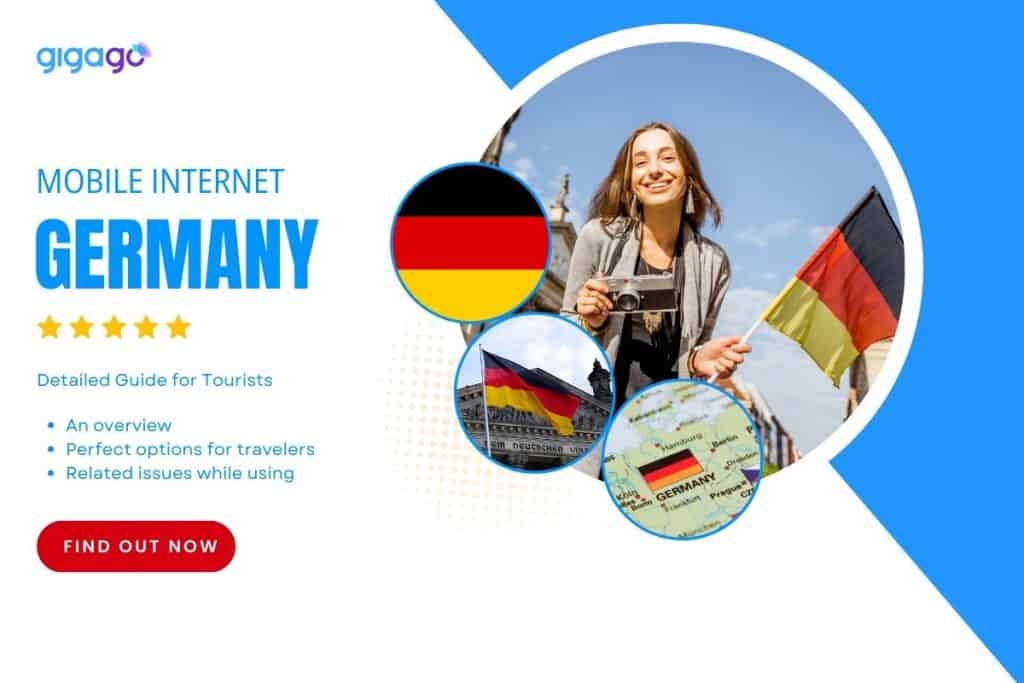
In this article
I. Mobile Internet in Germany – Coverage and Speed
There are 3 main mobile internet providers in Germany, including Vodafone, O2 and Telekom.
1. Germany Mobile Internet Coverage
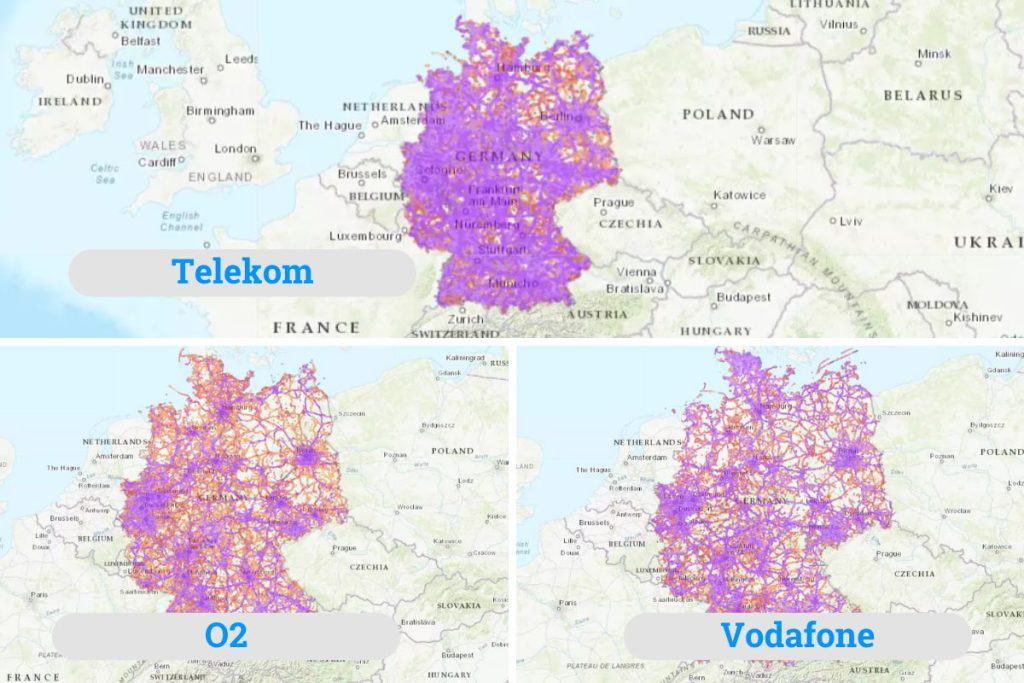
Germany has a high coverage rate for mobile internet. Although 4G and 5G coverage is expanding throughout Germany, several regions may still only have 3G coverage.
However, your area and unique demands will determine which provider is ideal for you. Let’s explore the big operators’ coverage data:
1.1. Telekom Germany
Coverage: In Germany, Telekom provides coverage for a number of technologies, including 2G, 3G, 4G, and the newest 5G. Tourists can only obtain prepaid SIM cards from the operator; eSIM cards are not available.
Advantages: Broadest coverage at stable speeds.
Disadvantages: Possibly more expensive than competitors.
1.2. Vodafone Germany
Coverage: Has a highly developed, fully covered 4G/5G network.
Advantages: 5G connection is available with specific prepaid plans.
Disadvantages: Rural coverage can be unreliable.
1.3. O2 Germany
Coverage: Offers only 4G; their 5G network’s coverage is quite limited.
Advantages: Often has the most affordable data plans.
Disadvantages: Restricted coverage outside of cities
► Our Recommendation: Based on your priorities, you can choose the “best” operator.
- Telekom is the best in terms of coverage and dependability, especially while traveling outside of large cities.
- Vodafone achieves an appropriate balance between reasonable prices and good coverage.
- O2 may be appropriate for tourists on a tight budget.
2. Germany Mobile Internet Speed
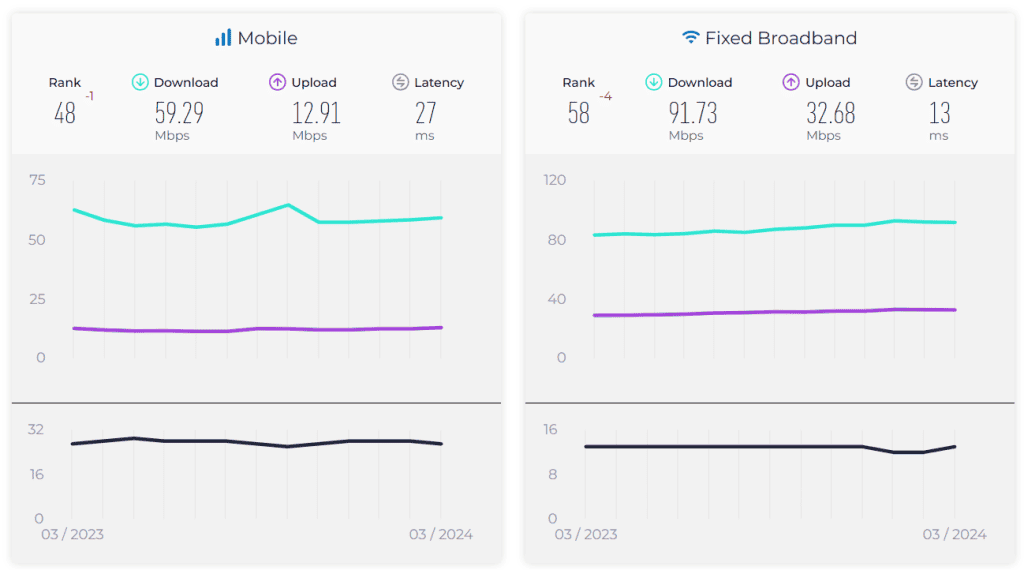
According to the Speedtest Global Index in March 2024, Germany ranks 48th in the world for mobile internet speeds:
- The average download speed is 59.29 Mbps, which makes it possible to play HD videos smoothly but may not be sufficient for higher resolution content.
- With upload speeds only 12.91 Mbps, they are far behind, which may affect video calls and other activities involving the sharing of files.
- Latency of 27ms is decent for general browsing and apps but may cause delays for online gaming.

► Our recommendation: Travelers should choose unlimited data plans from reputable providers with among the best 5G networks, such as Vodafone, Telekom, and O2 to take advantage of the fastest speeds possible.
II. What are Connectivity Options for Tourists to Germany?
You have main choices when it comes to connecting to Germany’s major networks: Germany SIM cards, eSIM, international roaming for Germany, Germany pocket Wifi, and free Wifi. Every option has pros and cons.
Here is the table show you clearly about all of option:
| Method | How it Works | Cost | Where to Buy | Pros | Cons |
| SIM Card | Physically inserted into your phone. Requires phone to be unlocked. | Varies depending on carrier and plan. Can be prepaid or postpaid. | Airport kiosks, phone stores in Germany, online retailers. | Affordable option for short trips. Widely available. | Requires unlocked phone. Might need to change APN settings. Limited data allowance in some plans. |
| eSIM | Downloaded electronically onto your phone. Requires the phone to be eSIM compatible and unlocked. | Varies depending on carrier and plan. Often similar to physical SIM cards. | Online from selected carriers or retailers. | No need to physically swap cards. Securely stored on your phone. | Requires eSIM compatible phone. Limited availability compared to physical SIM cards. |
| Roaming with German Operator | Use your existing phone plan while in Germany. | Varies depending on your home carrier and plan. Roaming charges can be expensive. | Not applicable (use your existing plan). | Convenient. No need to buy a new SIM. | Very expensive for data usage. Limited data allowance in most roaming plans. |
| Public WiFi | Free or paid Wi-Fi hotspots available in cafes, hotels, and public areas. | Varies. Free or depends on the hotspot provider. | Not applicable | Free or low-cost option. Widely available in urban areas. | Security risk on unsecured networks. Unreliable connection, especially in crowded areas. Limited coverage in rural areas. |
| Pocket WiFi | Portable device that provides Wi-Fi connection for your phone and other devices. | Varies depending on rental provider and data plan. Can be prepaid or postpaid. | Airport kiosks, rental companies online or in Germany. | Convenient for sharing the internet with multiple devices. Often offers higher data allowance than public WiFi. | Rental costs can add up. Battery life needs to be considered. May require a deposit. |
▶ Our recommendation:
You can purchase a physical Germany SIM card or an eSIM if you are a moderate data user who values affordability and flexibility. It is advised, however, to make sure your phone is unlocked before getting a Germany SIM card.
Pro tip: Check out our most recent list of eSIM-compatible phones to quickly determine whether your phone supports eSIM for Germany.
II. Internet Rates in Germany
Good to know: 1 EUR = 1.07 USD and 1 USD = 0.93 EUR (as of April 2024)
Tourists have several ways to access mobile internet in Germany: traditional SIM cards, convenient eSIMs, roaming, free public WiFi or portable WiFi devices for sharing connectivity with others. Prices vary depending on the option you choose. Here is a brief:
| Option | Rate (USD) |
| Prepaid Germany SIM card | Telekom: 3 GB of data for $10.67 (unlimited calling/SMS in Germany + $10.72 credit) Vodafone: 3 GB data for $10.71 (unlimited calling/SMS in Germany + 200 minutes or SMS from Germany to the EU) O2: 6GB data for $10.71 (unlimited calling/SMS in Germany) |
| Germany eSIM | From 1-50GB for $3.50-$125.98 (3-30 days of use) |
| Roaming with the Germany operators | From $0.012-$5,33 per MB, depends on which plan and carrier you choose |
| Public Wifi | Free |
| Pocket Wifi | From $5.26 per day |
▶ Our recommendations:
- If you are on a budget: Consider a SIM card from one of Germany’s Telekom or O2 – it’s a cost-effective option.
- If you prefer a convenience alternative: An eSIM for Germany lets you connect to the internet as soon as you land without changing physical SIM cards – perfect for travelers who need immediate online access.
III. Data SIM Card for Mobile Internet in Germany
It’s essential to keep connected when traveling in Germany in order to navigate, stay informed, and maintain relationships with loved ones back home. Fortunately, a number of data SIM card solutions are available that are suitable for travelers, with simple activation and reasonable data bundles.
Here is a brief summary of the various data SIM card types and their associated fees, converted to USD for convenience of comparison:
| Operator | Data Allowance | Minutes | SMS | Price (USD) |
| Deutsche Telekom | 10 GB | Unlimited calls within Germany | Unlimited texts within Germany | ~$22.40 |
| Vodafone Germany | 12 GB | Unlimited calls within Germany | Unlimited texts within Germany | ~$28.10 |
| O2 Germany | 20 GB | Unlimited calls within Germany | Unlimited texts within Germany | ~$33.70 |
Note: The prices listed above are for reference only. For the most up-to-date and accurate information, please contact the operator.
IV. Data eSIM for Germany – Best Option to Get Mobile Internet for Tourists
eSIM has some advantages over SIM cards as:
- Convenience: Smaller size, easier management (multiple eSIMs on one device), and better security (reduced risk of loss or theft).
- Flexibility: Works on multiple compatible devices (smartphones, smartwatches, tablets) and allows for fast carrier/plan switching without needing a physical SIM.
- Savings: Reduces costs by cutting the need for extra SIM cards and deliveries.
- Environmentally friendly: Reduces plastic waste from physical SIM cards.
Tourists visiting Germany can purchase eSIMs directly from German mobile operators or from reputable eSIM resellers.
1. Buy eSIM from Germany Operators
For mobile internet in Germany, major mobile networks O2, Vodafone, and Telekom offer prepaid eSIM options for travelers.
- How to buy: A passport or ID card is required to register. Please show one when you sign up.
- Pros: Guaranteed compatibility with your phone, activation and management through operators app.
- Cons: Activation process might be complex and time-consuming.
2. Buy eSIM from Gigago
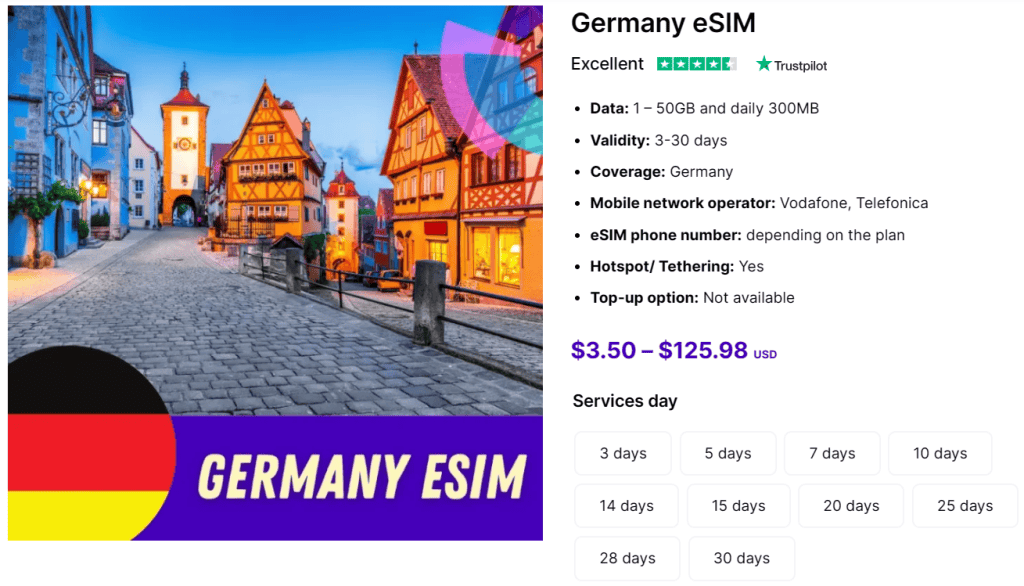
For ultimate convenience when visiting Germany, consider purchasing an eSIM online from a reputable reseller like Gigago. Unlike buying directly from the operators, purchasing eSIM with a reseller requires no passport, ID verification, or waiting for deliveries. Just scan a QR code then you can have internet access as soon as you land in Germany.
Here’s how to buy a Gigago Germany eSIM:
- Visit Gigago‘s website: Head to Gigago homepage and search for “Germany”.
- Choose your plan: Browse the available eSIM plans for Germany and pick one that best suits your data needs, budget, and trip duration.
- Complete your purchase: Make a secure payment online.
- Receive your eSIM: You’ll receive an email containing a QR code.
- Activate your eSIM: Scan the QR code with your phone’s camera and follow the steps.
- Connect to the internet: Enable data roaming on your phone and as long as your phone connects to a German network, you are ready to use mobile internet in Germany.
Gigago offers a range of budget-friendly eSIM data options ranging from $ 2.0 – $ 99.5 , starting at just $ 2.0 for 1 GB of data valid for 3 days. Gigago stands out with the widest variety and most competitive prices for travelers needing eSIM in Germany.
V. FAQs about Mobile Internet in Germany
What are my options for mobile internet in Germany?
You can choose between a traditional SIM card from a German carrier (O2, Vodafone, Telekom), a Germany eSIM, roaming, using public WiFi or renting a Portable WiFi device.
Can I use my existing mobile plan in Germany?
It depends on your carrier and plan. Roaming charges for mobile internet in Germany can be expensive. Check with your carrier before your trip.
Should I buy an eSIM directly from the operator or an eSIM reseller?
If you need more options and a simpler process, an eSIM reseller might be better than the operator.
VI. Conclusion
In conclusion, there are numerous ways to access mobile internet in Germany. Germany SIM cards and eSIMs are the greatest option out of all the available options because of their extensive coverage, affordability, and ease of use. Travelers looking for the most pricing and flexibility should purchase an eSIM plan for their eSIM-capable smartphones. Remember to choose the solution that best fits your needs and financial situation.



